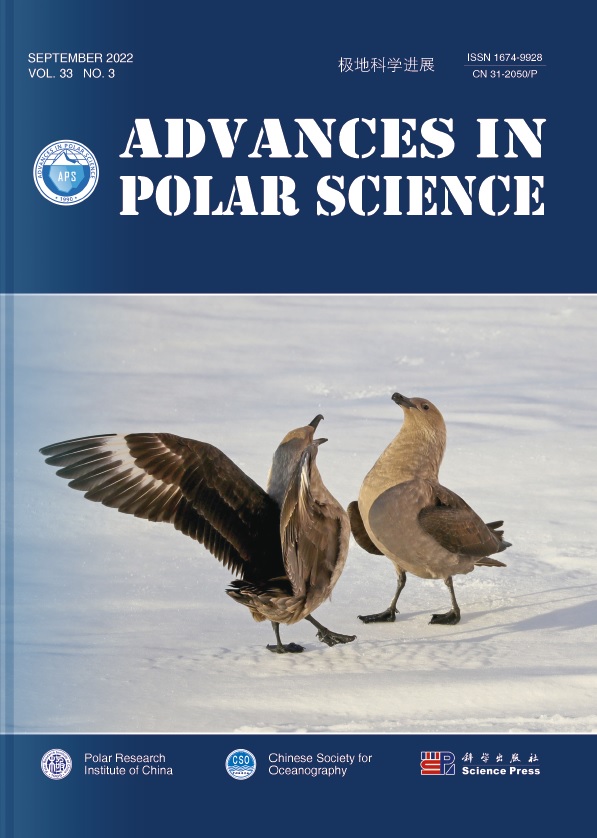The journal Advances in Polar Science (APS) published the third issue of 2022 (Vol.33, No.3) in October, and can be downloaded for free from the website:https://aps.chinare.org.cn/EN/current

In this issue, one Opinion Editorial and seven articles are merged. Dr. Wang from School of Chemistry and Chemical Engineering, Linyi University, First Institute of Oceanography, Ministry of Natural Resources, China, shared some thoughts on the development of polar microbial resources in the Opinion Editorial. Two papers focused on the sea ice dynamic in Arctic, four papers focused on the environmental factors in polar regions, and one paper presented seabird ecology in the Southern Ocean. APS pays particular attention to publishing original papers from early career scientists, and two-thirds of the papers are contributed by them in this issue.
Advances in Polar Science, established in 1990, is a peer-reviewed international journal, dedicated to research advances and achievements in polar regions. The journal is sponsored by the Polar Research Institute of China (PRIC) and the Chinese Society for Oceanography (CSO). Thanks to generous funding from PRIC, all accepted papers are published as open access, both in print and online, with no publication fees.
We have updated the International Editorial Board in June 2022, with the leadership of two EiCs, Dr. Huigen Yang and Dr. Ad H. L. Huiskes. Manuscripts submitted to APS are subject to peer review by at least two expert reviewers. The review process is managed by one of the expert disciplinary Associate Editors, working in collaboration with the international Editorial Board.
APS welcomes submission of manuscripts on relevant polar research topics from scientists of any nation. APS publishes Opinion Editorials, Reviews, Articles, Letters and Trends. Opinion Editorial, introduced in 2017, can be a statement of the opinion of a named author or authors, with a maximum of 1500 words. Up to now, 10 Opinion Editorials, subject to direct review by EiCs with final decision, were released on APS:
- Some thoughts on the development of polar microbial resources on Vol. 33, No.3
- The older ice, the better science on Vol. 33, No.2
- Towards an integrated study of subglacial conditions in Princess Elizabeth Land, East Antarctica on Vol. 32, No.2
- The SPLASH Action Group – Towards standardized sampling strategies in permafrost science on Vol. 31, No. 3
- Arctic environmental change research and Antarctic studies have mutual benefits on Vol. 31, No. 2
- The importance of long-term research and monitoring in the Ross Sea on Vol. 30, No.4
- T-MOSAiC—A new circumpolar collaboration on Vol. 30, No.4
- Towards truly integrated modeling and observing of marine ice sheets on Vol. 29, No.4
- Polar science needs a foundation: where is the research into polar infrastructure? on Vol. 29, No.1
- Optical remote sensing of snow fraction—status and future prospects on Vol. 28, No.4
Source: Advances in Polar Science (APS)
